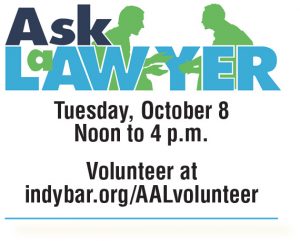Subscriber Benefit
As a subscriber you can listen to articles at work, in the car, or while you work out. Subscribe NowBy Michelle Allen, Indiana Department of Homeland Security
As an attorney who recently renewed her license, I also reported my pro bono hours to the Supreme Court. This is a familiar question posed to all registering attorneys. The question may evoke a feeling of fear by wondering if these hours will remain on our permanent record. It may throw you into a frenzy of adding up hours served, whether many or few. No matter your reaction, the question feels stale and accusing in the way a census does.
 Our Rules of Professional Conduct Rule 6.1 comment [3] states, “Personal involvement in the problems of the disadvantaged can be one of the most rewarding experiences in the life of the lawyer.” Comment [3] is not stale but colored with the promise of an enriched life not only for the disadvantaged but also for yourself. A mutual benefit is apportioned when you provide service to someone who lacks financial means or knowledge to navigate the legalities of life. Our legal-trained minds are practiced at finding the truth among the words, whether it be case law or a human. Too often we hear false words, but what comment [3] alludes to is the moment someone expresses sincere gratitude because you helped them during a time of need.
Our Rules of Professional Conduct Rule 6.1 comment [3] states, “Personal involvement in the problems of the disadvantaged can be one of the most rewarding experiences in the life of the lawyer.” Comment [3] is not stale but colored with the promise of an enriched life not only for the disadvantaged but also for yourself. A mutual benefit is apportioned when you provide service to someone who lacks financial means or knowledge to navigate the legalities of life. Our legal-trained minds are practiced at finding the truth among the words, whether it be case law or a human. Too often we hear false words, but what comment [3] alludes to is the moment someone expresses sincere gratitude because you helped them during a time of need.
Common deterrents to providing pro bono service are competency and time. Rule 1.1 requires a lawyer to provide competent representation to a client. Practicing outside of your general area can be scary, but a multitude of books and CLEs are available for you to learn a new area. IndyBar offers online CLEs, Practice Builder resources and, in general, a network of potential mentors who can guide you through your knowledge growth.
One way to gain initial skills is volunteering for one of IndyBar’s pro bono programs in order to gain client experience and walk away with a 2019 Commonly Asked Questions (CAQ) book that covers more than 20 practice areas.
In regards to your time, utilize a limited scope of representation as allowed by Rule 1.2. Under the rule, “a lawyer may limit the scope and objectives of the representation if the limitation is reasonable under the circumstances and the client gives informed consent.” If you isolate an issue you are competent to tackle, you will maximize your time while providing service to the client. A general rule of thumb is to document the scope of your representation, retain signatures from your client and yourself and retain a copy.
If you’re looking to feel the rewards of pro bono service but are not sure where to start, the IndyBar organizes several service dates throughout the year where all you need to do is sign up and show up. One upcoming opportunity is the IndyBar’s Ask A Lawyer event on Oct. 8, which provides limited-scope advice to individuals. All Ask A Lawyer sites are staffed with two or more attorneys and a CAQ book is provided so you won’t be alone and answers will be available at your fingertips.
Instead of fearing pro bono reporting the next time it comes around, look at it as a challenge or reminder to give yourself fuller life experiences through the service areas of poverty law, civil rights, charitable organization representation or administration of justice.
To volunteer for one or more of the IndyBar’s pro bono programs, go to indybar.org/probono.•
Please enable JavaScript to view this content.
